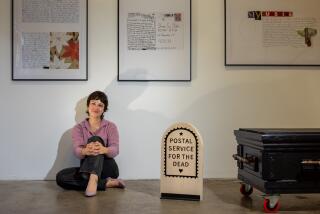Patient’s Will to Live Is in the Mail
- Share via
There is a patient in the hospital who has been here longer than the doctors or the nurses, the EKG machine and the wall paint. When he came to live on the unit, President Nixon was in office.
The patient, a thin relic of a man, is a gentle, opaque presence on the unit. He wears a couple of thick lumberjack shirts to keep his pants up. He has not allowed a dentist near him in decades, so he chews with teeth that resemble nubs of Indian corn. He rarely talks to us, leaving groups that all patients are expected to attend. He kindly waves away meeting with his psychologist.
Though he seems not to believe in the restorative powers of psychotherapy, my patient has a strong link to the world: mail order. For most chronically ill, largely forgotten patients, hospital mail is a friend that breaks your heart--maybe a postcard or thin letter a week--but his box is always fat with his passions of the moment. There are subscriptions to health journals, policy journals, scientific journals--he is especially keen on molecular biology. There are newspapers and weekly news magazines. With these in hand, he sits in the hall next to the exercise bicycle, underlining vigorously.
Then, less consistently but more excitingly, there are the packages. They arrive from herbal tea exporters in Belgium and muscle-building factories in lower Manhattan. Recently, he has been ordering nutritional supplements.
*
Bulky boxes arrive on the unit from companies with names that make you feel as if you could live forever just by reading them. Hospital procedure obliges us to stand near patients when they open packages (knives and gun parts can come through the mail), and we have watched him pull out potency formulas, vibrancy pills, memory accelerators and longevity tonics. Ginseng and Spanish fly. Stress-reducing tabs as large as quarters and echinacea. The packages arrive every week, and every week we must respond the same way.
Medications other than what we prescribe are not permitted in the hospital. This is policy. We need absolute control over a patient’s pharmaceutical life. After all these years, he knows this. He also knows that he already takes vitamins, minerals and antioxidants, along with his many antipsychotic, antidepressant and anti-anxiety medications. Yet the boxes keep arriving. It is beyond logic and reasoning. It is biological, a drive for improvement, a hunger for bettering. It is a good thing.
We all are sad when the packages are retaped and returned to the mail room. The nurse apologizes to him and explains, again, why he cannot keep this herb or that coenzyme. He shakes his head, thwarted. But he is not thwarted ultimately. He knows another shipment is on the way.
These mail-order efforts of his are a lucid turning toward health, a circling toward light. For 25 years, we have known about his illness. We know he hears grave voices, that they have menaced him and compelled him to slash himself with razors and drink cleaning fluid. Massive doses of our medications have not driven the voices away. Many could not survive this constant despising company. People kill themselves for less than this. Yet he continues to turn toward the light. It appears that he has no intention of giving up. The question for science is, why?
His inner world, in opposition to his illness, is rich with possibility. Others, within and outside of the hospital, have given in to the troubles they struggle with or the losing hands they have been dealt. They live but are slightly less than alive. But his journals and magazines, and the stream of packages he tries to slip past us, are intense signs of life--as strong as a bounding pulse or clear breath.
In psychiatry, we have sophisticated measures of disease, and books full of diagnostic criteria. We do not have measures of health that explain why the very person most entitled to lose all appetite is still filled with hunger. Some studious researcher should quantify this capacity, and then legitimize it with a set of paradoxical, polysyllabic names: unreasonable optimism, impossible hopefulness, inexplicable vitality.
These are measurements of life, and my patient is full of them, even though he cannot survive outside of an institution, and even though his weekly chart notes are filled with details of mental disease. We should know more about the rest of him. Our patients are supposed to learn from us. I would argue it is the other way around.






